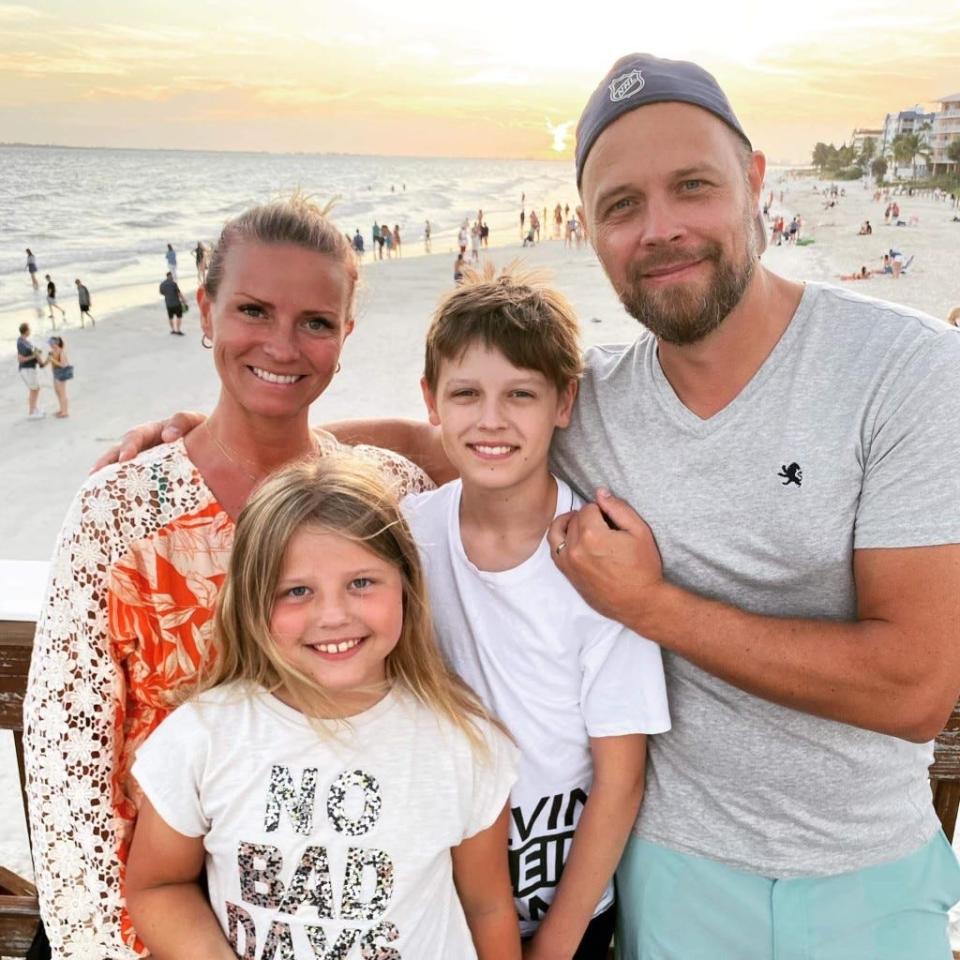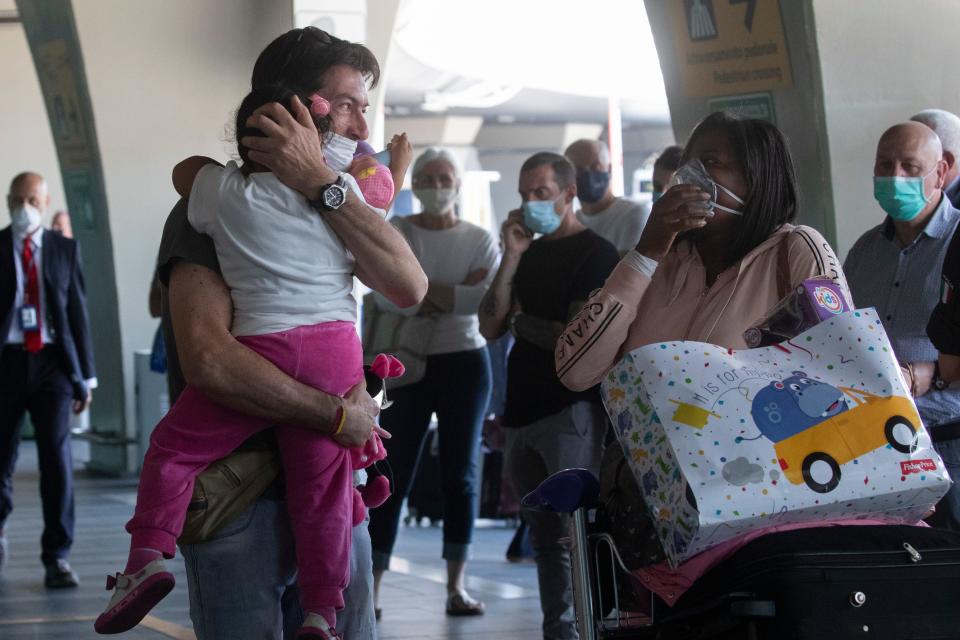'Without our loved ones, we are lost': Travelers relieved at US plans to reopen borders
Peter Sibner almost broke down in tears Monday when he heard that the U.S. will lift its ban on vaccinated international travelers in early November.
"This is a massive day of happiness for a lot of us," Sibner, 42, told USA TODAY.
Sibner, who is from Sweden but lives in Lakewood Ranch, Florida, with his family, said he had been hoping for a bit of good news every day for the last 18 months.
The global community has faced a long year and a half in the face of the COVID-19 pandemic, made insufferable for some separated from loved ones due to travel restrictions. Unable to cross international borders to the U.S., the past year was measured by distance, canceled trips and FaceTime calls.
News that the U.S. is lifting its ban on vaccinated international travelers in early November brought a wave of relief, even though a specific lift date has not yet been announced.

► US to drop travel ban: For vaccinated international travelers starting in early November
►What travelers need to know: The new COVID rules for international flights to US don't just impact foreign tourists
On Twitter, under the hashtag #LoveIsNotTourism, members of the community shared their reactions.
"It's official. They finally announced it. Our suffering is finally over," @MacyKavanaugh tweeted noting that Monday was a day of celebration.
Some shared photos of themselves and loved ones to the social media platform.
"After 2 years apart we finally have a chance to reunite!! it's been tough but finally there is a light at the end of the tunnel #LoveIsNotTourism," @purahss wrote.
after 2 years apart we finally have a chance to reunite!! it's been tough but finally there is a light at the end of the tunnel 😭😭 #LoveIsNotTourism pic.twitter.com/fkGGsCLrdc
— abbey✨ (@purahss) September 20, 2021
New policy replaces confusing restrictions
All foreign travelers flying to the U.S. will need to demonstrate proof of vaccination before boarding, as well as proof of a negative COVID-19 test taken within three days of flight, said White House COVID-19 coordinator Jeff Zients, who announced the new policy on Monday. Biden will also tighten testing rules for unvaccinated American citizens, who will need to be tested within a day before returning to the U.S., as well as after they arrive home.
Fully vaccinated passengers will not be required to quarantine, Zients said.
The new policy replaces a patchwork of travel restrictions first instituted by President Donald Trump last year and tightened by Biden earlier this year that restrict travel by non-citizens who have in the prior 14 days been in the United Kingdom, European Union, China, India, Iran, Republic of Ireland, Brazil and South Africa.
The ban resulted in heartache for some
During the pandemic, the Sibner family endured a funeral over FaceTime, with another coming up next week on top of separation from family and loved ones abroad. Sibner said his children have essentially had to grow up without their grandparents due to the travel ban.
"That was our biggest fear when we decided to move to the States 'what if something happens back home and we're not able to go?'" he said.
Roxanne Randel, 45, who was born in the States and has dual citizenship in the U.S. and the United Kingdom, has been living in the U.K. during the pandemic and had four trips canceled during the pandemic.
On one of those trips she intended to see her foster mother who had brain cancer.
Her foster mom "was all the family I had" Randel told USA TODAY.
Before she could make the trip, Randel's foster mother died. Randel wasn't able to attend the funeral.
"I was happy to hear finally so many people torn apart can reunite," Randel said. "May it never be allowed to happen again under any circumstances. Without our loved ones, we are lost."
► US extends land border restrictions: With Canada, Mexico through Oct. 21
Some think the ban took too long to lift
Randel said it took the U.S. "far too long" to lift the ban on international travelers.
"It was political," she said.
Abbie Gould wrote on Twitter that the removal of the ban will come too late for her family to visit.
"Not going to lie - as grateful as I am - I am still gutted this is just too late," Gould wrote using #LoveIsNotTourism. "My parents possibly can't fly in November so they are considering still holding back until Spring now. We were so desperate for October, so it's a bit of a blow."
Sibner said that he, too, felt it took too long for the ban to lift. But he's not holding a grudge. The fact that vaccinated international travelers will be able to enter the country soon "means the world" to him.

"We wanted the American Dream and we have it so we didn't want to pack up and leave and go home," he said. "Now, finally, things can go back to normal."
Sibner expects to have family on the first flight over.
No specific reopening date was given by the White House while announcing the new international "air travel system" resulting in some questions from travelers.
"Ok yea ...ima need a date LOL gunna need to know if the flight we booked for Nov 1st isnt gunna be canceled bro #LoveIsNotTourism," @murdamer tweeted.
Some loved ones to remain separated by US land borders are frustrated
While there is somewhat of an end in sight for the ban on international travelers arriving in the U.S. by air, the restrictions on land borders between the U.S. and Canada and the U.S. and Mexico are set to remain for another month.
Yvonne Pilon, 37, lives in Windsor, a city in Ontario, Canada, located across from Detroit, Michigan. The cities are separated by the Detroit River. Her friends and family live in the U.S. with her friends and sister in Michigan and her mom in Florida.
"Currently, the only way to visit family or friends is by air. I just completed my first trip which cost me approximately $1,300 + 10 hours travel which would normally be about $12 in tolls and 30 minutes in travel," she told USA TODAY.
Pilon also just booked another flight for Canadian Thanksgiving. While she's booked a second trip, she typically would be in Detroit much more frequently, usually venturing across the river a few times each month for shopping, sporting events and dining.
Flight ✈️ $790
Bags 💼 $65
Covid Testing $267
Airport Parking $179
Gas⛽️to YYZ $60
Vacation days to travel 2
VS.
Toll $12.75 (land border)
The reality for those visiting family, partners & friends in 🇨🇦 🇺🇸 border towns.
Reunification should not be limited to those w/💰.— Yvonne Pilon (@YvonnePilon) September 19, 2021
But not everyone can afford to spend hundreds or thousands on travel to fly and circumvent land border restrictions.
"This puts a huge income gap between who can see their family and who can't," she said.
"Canada provided a detailed plan for re-opening and we are still waiting for the plan from the U.S. side. Not to mention the questions that arise that it’s safer to be in a plane and airport than (in) a car crossing a land border."
Sen. Jeanne Shaheen, NH-D, tweeted USA TODAY's article on the reopening of borders to international travelers on Monday, calling the move "discouraging" for businesses and border communities in New Hampshire.
"Canada reopened travel for vaccinated people & the U.S. should do the same," Shaheen wrote. "I understand the need for caution but we can responsibly reopen the border by following public health protocols. I urge the (administration) to reconsider."
Briana Martínez, 27, married her husband, who is from Mexico, in May in a civil ceremony when he was able to fly into the U.S.
The couple decided to have a more formal ceremony in November for friends and family in the states and in Mexico. But their guests are not having the easiest time with planning to attend.
"Our family and friends from Mexico have had to wait month to month to see if the land borders will be opened and with no hopes they've had to pay almost triple the amount for an international flight to make it out here for the wedding," Martínez said.
The land border restrictions aren't the only challenge. Martínez's guests are vaccinated but she isn't sure whether their vaccines will meet requirements for entry.
"With the new information provided today we are learning that the AstraZeneca vaccine has not officially been cleared to be accepted for those traveling to the U.S., which is the vaccine most of our family and friends that will be coming have," she said.
The list of approved vaccines is still being developed, White House Press Secretary Jen Psaki said Monday.
Other borders remain closed and restrictions are growing
Travel is complicated in a pandemic world regardless of origin or destination.
As the U.S. plans to open international borders to some visitors, restrictions on U.S. citizens are rising in Europe and countries in other parts of the world including in Central and South America have entry requirements as well.
Across the globe, travel restrictions put in place country by country create an incoherent image attempting to mirror what travel used to look like as the world continues to deal with COVID-19 and its variants with access to vaccines varying in different parts of the world.
Contributing: The Associated Press
This article originally appeared on USA TODAY: US to open borders to vaccinated tourists: What it means for travelers

 Yahoo Movies
Yahoo Movies 
